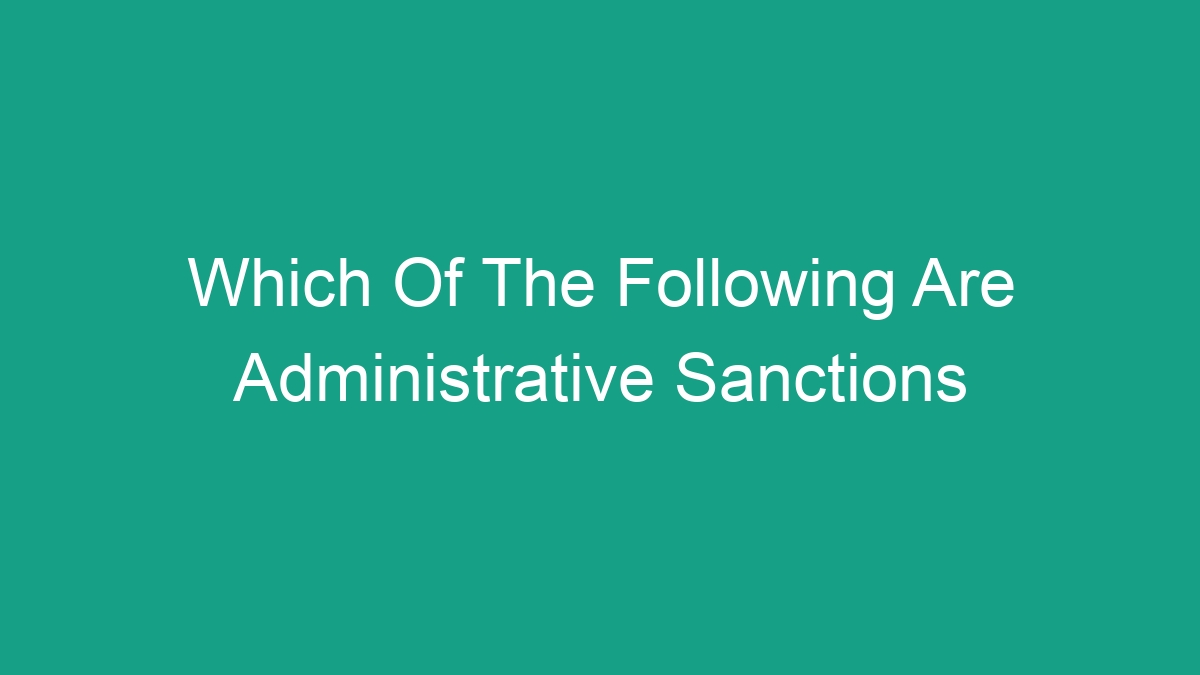
Administrative sanctions are penalties imposed by a regulatory body or government agency to enforce compliance with laws and regulations. These sanctions are usually non-criminal in nature but can have significant financial and reputational consequences for individuals or organizations. In this article, we will examine a range of administrative sanctions and highlight the key features of each.
Types of Administrative Sanctions
Administrative sanctions can take many forms, depending on the nature of the violation and the authority responsible for enforcement. Some common types of administrative sanctions include:
- Fines: Monetary penalties imposed on individuals or organizations for violating regulations or laws. Fines can vary widely in amount, depending on the severity of the violation and the regulatory framework in place.
- License Suspension or Revocation: Regulatory bodies often have the authority to suspend or revoke professional licenses or permits for individuals or businesses found to be in violation of regulations. This can effectively prevent the individual or business from operating in their professional capacity.
- Corrective Action Orders: Regulatory agencies may require individuals or organizations to take specific actions to remedy violations or prevent future non-compliance. This could include implementing new procedures, conducting training, or making physical changes to facilities.
- Reputational Consequences: In some cases, administrative sanctions can include measures that damage the reputation of the individual or organization, such as public censure or the publication of enforcement actions.
- Restitution: Individuals or organizations may be required to make restitution to parties who have suffered harm as a result of regulatory non-compliance. This could involve financial compensation or other forms of redress.
Regulatory Frameworks for Administrative Sanctions
Administrative sanctions are typically imposed by regulatory agencies or government bodies with the authority to enforce specific laws and regulations. These agencies operate within established regulatory frameworks and are tasked with overseeing compliance within their respective jurisdictions.
Key features of regulatory frameworks for administrative sanctions include:
- Statutory Authority: Regulatory agencies derive their authority to impose administrative sanctions from specific legislation or regulations. This provides the legal basis for their enforcement actions and ensures that they are acting within the bounds of the law.
- Enforcement Procedures: Regulatory frameworks outline the procedures that regulatory agencies must follow when imposing administrative sanctions. This could include requirements for investigations, hearings, and appeals processes.
- Penalty Guidelines: Some regulatory frameworks provide guidelines for the imposition of administrative sanctions, including factors to consider when determining the appropriate penalties for different types of violations.
- Compliance Monitoring: Regulatory agencies are often responsible for monitoring compliance with regulations through inspections, audits, and other means. This allows them to identify potential violations and take enforcement action when necessary.
- Transparency and Accountability: Many regulatory frameworks emphasize the importance of transparency and accountability in the enforcement of administrative sanctions. This could involve requirements for public disclosure of enforcement actions and mechanisms for oversight and review of regulatory decisions.
Challenges and Considerations
While administrative sanctions play a crucial role in promoting regulatory compliance, there are various challenges and considerations associated with their use. These include:
- Proportionality: It is important for administrative sanctions to be proportional to the nature and severity of the violation. Regulators must carefully consider the potential impact of sanctions on individuals or organizations, especially in cases where the violation was unintentional or the result of extenuating circumstances.
- Consistency: Regulatory agencies are often called upon to demonstrate consistency in the application of administrative sanctions across different cases and industry sectors. Inconsistencies in enforcement can undermine the credibility and effectiveness of the regulatory framework.
- Due Process: Individuals and organizations subject to administrative sanctions have a right to due process, including the opportunity to present their case, challenge allegations, and appeal decisions. Regulatory frameworks must provide mechanisms for fair and transparent enforcement procedures.
- Compliance Costs: Administrative sanctions can impose significant financial costs on individuals and organizations, including fines, expenses related to corrective actions, and loss of revenue due to license suspension. These costs can be a significant burden, particularly for small businesses and individuals with limited resources.
- Effectiveness: The effectiveness of administrative sanctions in deterring non-compliance and promoting regulatory adherence is a key consideration. Regulators must continually assess the impact of sanctions and adjust their enforcement strategies as needed to achieve desired outcomes.
Conclusion
Administrative sanctions are a critical tool for promoting regulatory compliance and ensuring the integrity of various industries and professional sectors. Through the imposition of fines, license suspensions, corrective action orders, and other measures, regulatory agencies can hold individuals and organizations accountable for non-compliance with laws and regulations.
However, the use of administrative sanctions must be carefully balanced with considerations of proportionality, consistency, due process, and effectiveness. Regulatory frameworks play a crucial role in providing the legal basis and procedural safeguards for the imposition of administrative sanctions, while also promoting transparency and accountability in enforcement actions.
Overall, administrative sanctions serve as a mechanism for maintaining the rule of law, protecting public interests, and upholding standards of professional conduct and ethical behavior.



